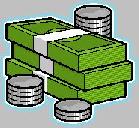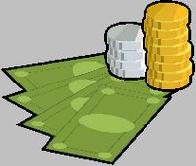
 |
|
| Financial Terms | |
| runup |
|
Information about financial, finance, business, accounting, payroll, inventory, investment, money, inventory control, stock trading, financial advisor, tax advisor, credit.
Main Page: money, accounting, financial, tax advisor, inventory control, business, payroll, stock trading, |
Definition of runup
runupthe period before a formal announcement of a takeover bid in which one or more bidders are either preparing to make an announcement or speculating that someone else will.
Related Terms:economic components modelAbrams’ model for calculating DLOM based on the interaction of discounts from four economic components. PPF (periodic perpetuity factor)a generalization formula invented by Abrams that is the present value of regular but noncontiguous cash flows that have constant growth to perpetuity. All or noneRequirement that none of an order be executed unless all of it can be executed at the specified price. All-or-none underwritingAn arrangement whereby a security issue is canceled if the underwriter is unable Announcement dateDate on which particular news concerning a given company is announced to the public. Annualized holding period returnThe annual rate of return that when compounded t times, would have At-the-moneyAn option is at-the-money if the strike price of the option is equal to the market price of the  Average collection period, or days' receivablesThe ratio of accounts receivables to sales, or the total Before-tax profit marginThe ratio of net income before taxes to net sales. Bid priceThis is the quoted bid, or the highest price an investor is willing to pay to buy a security. Practically Bid-askedspread The difference between the bid and asked prices. BidderA firm or person that wants to buy a firm or security. Call money rateAlso called the broker loan rate , the interest rate that banks charge brokers to finance Competitive biddingA securities offering process in which securities firms submit competing bids to the Compounding periodThe length of the time period (for example, a quarter in the case of quarterly Credit periodThe length of time for which the customer is granted credit.  Discount periodThe period during which a customer can deduct the discount from the net amount of the bill Discounted payback period ruleAn investment decision rule in which the cash flows are discounted at an Dow Jones industrial averageThis is the best known U.S.index of stocks. It contains 30 stocks that trade on Earnings before interest and taxes (EBIT)A financial measure defined as revenues less cost of goods sold Either/or facilityAn agreement permitting a bank customer to borrow either domestic dollars from the Either-way marketIn the interbank Eurodollar deposit market, an either-way market is one in which the bid European Monetary System (EMS)An exchange arrangement formed in 1979 that involves the currencies Evaluation periodThe time interval over which a money manager's performance is evaluated. GoodwillExcess of the purchase price over the fair market value of the net assets acquired under purchase Holding periodLength of time that an individual holds a security. Holding period returnThe rate of return over a given period. Hot moneyMoney that moves across country borders in response to interest rate differences and that moves International Monetary FundAn organization founded in 1944 to oversee exchange arrangements of International Monetary Market (IMM)A division of the CME established in 1972 for trading financial In-the-moneyA put option that has a strike price higher than the underlying futures price, or a call option Law of one priceAn economic rule stating that a given security must have the same price regardless of the Make a marketA dealer is said to make a market when he quotes bid and offered prices at which he stands Monetary goldGold held by governmental authorities as a financial asset. Monetary policyActions taken by the Board of Governors of the Federal Reserve System to influence the Monetary / non-monetary methodUnder this translation method, monetary items (e.g. cash, accounts Money baseComposed of currency and coins outside the banking system plus liabilities to the deposit money banks. Money center banksBanks that raise most of their funds from the domestic and international money markets, relying less on depositors for funds. Money managementRelated: Investment management. Money managerRelated: Investment manager. Money marketMoney markets are for borrowing and lending money for three years or less. The securities in Money market demand accountAn account that pays interest based on short-term interest rates. Money market fundA mutual fund that invests only in short term securities, such as bankers' acceptances, Money market hedgeThe use of borrowing and lending transactions in foreign currencies to lock in the Money market notesPublicly traded issues that may be collateralized by mortgages and MBSs. Money purchase planA defined benefit contribution plan in which the participant contributes some part and Money rate of returnAnnual money return as a percentage of asset value. Money supplyM1-A: Currency plus demand deposits Multiperiod immunizationA portfolio strategy in which a portfolio is created that will be capable of Net periodThe period of time between the end of the discount period and the date payment is due. Neutral periodIn the Euromarket, a period over which Eurodollars are sold is said to be neutral if it does not New moneyIn a Treasury auction, the amount by which the par value of the securities offered exceeds that of Noncompetitive bidIn a Treasury auction, bidding for a specific amount of securities at the price, whatever it One man pictureThe picture quoted by a broker is said to be a one-man picture if both the bid and offered One-factor APTA special case of the arbitrage pricing theory that is derived from the one-factor model by One-way market1) A market in which only one side, the bid or asked, is quoted or firm. Out-of-the-money optionA call option is out-of-the-money if the strike price is greater than the market price Phone switchingIn mutual funds, the ability to transfer shares between funds in the same family by Postponement optionThe option of postponing a project without eliminating the possibility of undertaking it. Precautionary demand (for money)The need to meet unexpected or extraordinary contingencies with a Risk pronewilling to pay money to transfer risk from others. Seasoned datingsExtended credit for customers who order goods in periods other than peak seasons. Seasoned issueIssue of a security for which there is an existing market. Related: Unseasoned issue. Seasoned new issueA new issue of stock after the company's securities have previously been issued. A SIMEX (Singapore International Monetary Exchange)A leading futures and options exchange in Singapore. Speculative demand (for money)The need for cash to take advantage of investment opportunities that may arise. Stand-alone principleInvestment principle that states a firm should accept or reject a project by comparing it Subperiod returnThe return of a portfolio over a shorter period of time than the evaluation period. T-period holding-period returnThe percentage return over the T-year period an investment lasts. TakeoverGeneral term referring to transfer of control of a firm from one group of shareholder's to another Target zone arrangementA monetary system under which countries pledge to maintain their exchange rates Time value of moneyThe idea that a dollar today is worth more than a dollar in the future, because the dollar TombstoneAdvertisement listing the underwriters to a security issue. Transaction demand (for money)The need to accommodate a firm's expected cash transactions. Unseasoned issueIssue of a security for which there is no existing market. See: seasoned issue. Waiting periodTime during which the SEC studies a firm's registration statement. During this time the firm Workout periodRealignment period of a temporary misaligned yield relationship that sometimes occurs in Zero-one integer programmingAn analytical method that can be used to determine the solution to a capital Accounting periodThe period of time for which financial statements are produced – see also financial year. Earnings before interest and taxes (EBIT)The operating profit before deducting interest and tax. Earnings before interest, taxes, depreciation and amortization (EBITDA)The operating profit before deducting interest, tax, depreciation and amortization. Make-readySee set-up. Period costsThe costs that relate to a period of time. Profit before interest and taxes (PBIT)See EBIT. Periodic inventory systemAn inventory system in which the balance in the Inventory account is adjusted for the units sold only at the end of the period. earnings before interest and income tax (EBIT)A measure of profit that Average Collection PeriodAverage number of days necessary to receive cash for the sale of Money MarketA market that specializes in trading short-term, low-risk, very liquid Payback PeriodThe number of years necessary for the net cash flows of an compounding periodthe time between each interest computation make-or-buy decisiona decision that compares the cost of payback periodthe time it takes an investor to recoup an period costcost other than one associated with making or acquiring inventory periodic compensationa pay plan based on the time spent on the task rather than the work accomplished takeoverthe acquisition of managerial control of the corporation Odd first or last periodFixed-income securities may be purchased on dates GoodwillThe excess of the price paid to buy another company over the book value of Negative goodwillA term used to describe a situation in which a business combination Reporting periodThe time period for which transactions are compiled into a set of financial statements. Related to : financial, finance, business, accounting, payroll, inventory, investment, money, inventory control, stock trading, financial advisor, tax advisor, credit. |